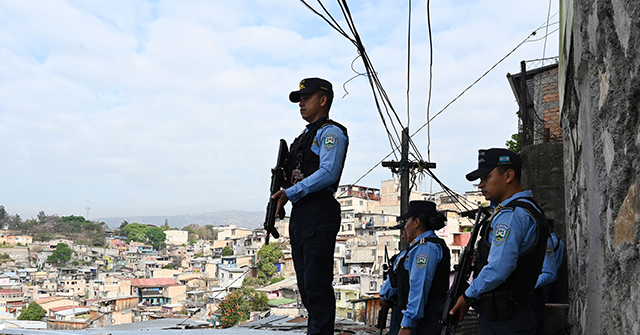El Salvador’s President Nayib Bukele, who has made fighting gang violence into a defining issue for his presidency, sent 5,000 soldiers and 500 police to surround the northwestern town of Nueva Concepcion on Wednesday after alleged gangsters killed a police officer.
As is his custom, Bukele announced the operation on Twitter, complete with a dramatic professionally filmed video of his troops locking, loading, mounting up, and rolling out:
Ante el homicidio ocurrido ayer, de un agente de nuestra @PNCSV, por parte de pandilleros que aún se encuentran en algunos sectores de nuestro país, escondidos, huyendo del Régimen de Excepción…
Desde esta madrugada, establecimos un cerco de seguridad alrededor del municipio de… pic.twitter.com/6r8BxuLBDb
— Nayib Bukele (@nayibbukele) May 17, 2023
Bukele said the perpetrators of the cop killing “will pay dearly for the murder of our hero.”
The police officer in question was killed Tuesday while patrolling in Nueva Concepcion, a town of about 30,000 located 42 miles northwest of the national capital, San Salvador. The National Police said the victim was “attacked by gang members while on patrol with other police officers.”
“One terrorist was captured at the scene. We will execute an operation to find the other responsible parties,” the National Police reported.
Bukele sent a remarkable, but not unprecedented, show of military force to assist with the investigation. In October, he sent 2,000 troops to surround the town of Comasagua after an alleged gang killing, and in November the city of Soyapango was blockaded by 10,000 soldiers and police in an operation to root out gang members.
“As of this moment, the municipality of Soyapango is totally surrounded. Extraction teams from the police and the army are tasked with extricating all the gang members still there one by one,” Bukele said on that occasion.
Such enormous demonstrations of force naturally draw scrutiny from human rights organizations, especially since villagers in El Salvador have good historical reasons to feel nervous when they see columns of soldiers marching up to their homes. The Salvadoran public, however, is generally supportive of Bukele’s war on gangs and the president enjoys an astronomical approval rating. A poll in March showed almost 70 percent of the public wants to throw away the constitutional term limits on the presidency so Bukele can serve again.
“They search you and ask for your identity papers to verify where you live, but that’s fine — it’s all for our safety,” a resident of Soyapango told bemused BBC reporters in December when the city was surrounded by soldiers.
Bukele’s maximalist approach to ending gang violence made international headlines in February when he opened a titanic prison for gang members that has 40,000 beds, more than doubling El Salvador’s prison capacity in a single stroke. Bukele proceeded to fill the prison with the bizarre spectacle of marching in hundreds of nearly naked convicts while cameras rolled — in part to humiliate them, and also so his critics could see they were all covered in gang tattoos.
WATCH: Law and Order: El Salvador Builds “Mega Prison” to Eradicate Gangs:
Presidency of the Republic of El Salvador via Storyful


